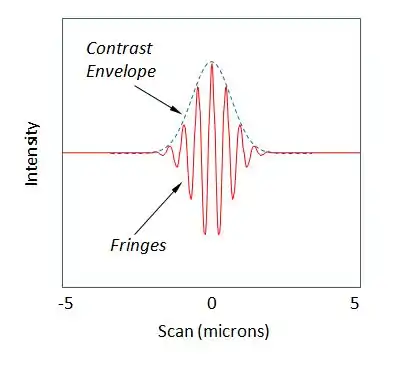Coherence scanning interferometry
Coherence scanning interferometry (CSI) refers to a class of optical surface measurement methods wherein the localization of interference fringes during a scan of optical path length provides a means to determine surface characteristics such as topography, transparent film structure, and optical properties. CSI is currently the most common interference microscopy technique for areal surface topography measurement.[1] The term "CSI" was adopted by the International Organization for Standardization (ISO).[2]

The technique encompasses but is not limited to instruments that use spectrally broadband, visible sources (white light) to achieve interference fringe localization. CSI uses either fringe localization alone or in combination with interference fringe phase, depending on the surface type, desired surface topography repeatability and software capabilities. The table below compiles alternative terms that conform at least in part to the above definition.
| Acronym | Term | Reference |
|---|---|---|
| CSI | Coherence scanning interferometry | [3] |
| CPM | Coherence probe microscope | [4] |
| CSM | Coherence scanning microscope | [5] |
| CR | Coherence radar | [6] |
| CCI | Coherence correlation interferometry | [7] |
| MCM | Mirau correlation microscope | [8] |
| WLI | White light interferometry | [9] |
| WLSI | White light scanning interferometry | [10] |
| SWLI | Scanning white light interferometry | [11] |
| WLS | White Light Scanner | |
| WLPSI | White light phase shifting interferometry | [12] |
| VSI | Vertical scanning interferometry | [13] |
| RSP | Rough surface profiler | [14] |
| IRS | Infrared scanning | [15] |
| OCT | Full-Field Optical Coherence Tomography | [16] |
References
- de Groot, P (2015). "Principles of interference microscopy for the measurement of surface topography". Advances in Optics and Photonics. 7: 1–65. Bibcode:2015AdOP....7....1D. doi:10.1364/AOP.7.000001.
- ISO (2013). 25178-604:2013(E): Geometrical product specification (GPS) – Surface texture: Areal – Nominal characteristics of non-contact (coherence scanning interferometric microscopy) instruments (2013(E) ed.). Geneva: International Organization for Standardization.
- Windecker, R.; Haible, P.; Tiziani, H. J. (1995). "Fast Coherence Scanning Interferometry for Measuring Smooth, Rough and Spherical Surfaces". Journal of Modern Optics. 42 (10): 2059–2069. Bibcode:1995JMOp...42.2059W. doi:10.1080/09500349514551791.
- Davidson, M.; Kaufman, K.; Mazor, I. (1987). "The Coherence Probe Microscope". Solid State Technology. 30 (9): 57–59.
- Lee, B. S.; Strand, T. C. (1990). "Profilometry with a coherence scanning microscope". Appl Opt. 29 (26): 3784–3788. Bibcode:1990ApOpt..29.3784L. doi:10.1364/ao.29.003784. PMID 20567484.
- Dresel, T.; Häusler, G.; Venzke, H. (1992). "Three-dimensional sensing of rough surfaces by coherence radar". Applied Optics. 31 (7): 919–925. Bibcode:1992ApOpt..31..919D. doi:10.1364/ao.31.000919. PMID 20720701.
- Lee-Bennett, I. (2004). Advances in non-contacting surface metrology. Optical Fabrication and Testing, OTuC1.
- Kino, G. S.; Chim, S. S. C. (1990). "Mirau correlation microscope". Applied Optics. 29 (26): 3775–83. Bibcode:1990ApOpt..29.3775K. doi:10.1364/ao.29.003775. PMID 20567483.
- Larkin, K. G. (1996). "Efficient nonlinear algorithm for envelope detection in white light interferometry". Journal of the Optical Society of America A. 13 (4): 832. Bibcode:1996JOSAA..13..832L. CiteSeerX 10.1.1.190.4728. doi:10.1364/josaa.13.000832.
- Wyant, J. C. (September, 1993). How to extend interferometry for rough-surface tests. Laser Focus World, 131-135.
- Deck, L.; de Groot, P. (1994). "High-speed noncontact profiler based on scanning white-light interferometry". Applied Optics. 33 (31): 7334–7338. Bibcode:1994ApOpt..33.7334D. doi:10.1364/ao.33.007334. PMID 20941290.
- Schmit, J.; Olszak, A. G. (2002). "Challenges in white-light phase-shifting interferometry". Proc. SPIE. Interferometry XI: Techniques and Analysis. 4777: 118–127. Bibcode:2002SPIE.4777..118S. doi:10.1117/12.472211.
- Harasaki, A.; Schmit, J.; Wyant, J. C. (2000). "Improved vertical-scanning interferometry". Applied Optics. 39 (13): 2107–2115. Bibcode:2000ApOpt..39.2107H. doi:10.1364/ao.39.002107. hdl:10150/289148.
- Caber, P. J. (1993). "Interferometric profiler for rough surfaces". Appl Opt. 32 (19): 3438–3441. Bibcode:1993ApOpt..32.3438C. doi:10.1364/ao.32.003438. PMID 20829962.
- De Groot, P.; Biegen, J.; Clark, J.; Colonna; de Lega, X.; Grigg, D. (2002). "Optical Interferometry for Measurement of the Geometric Dimensions of Industrial Parts". Applied Optics. 41 (19): 3853–3860. Bibcode:2002ApOpt..41.3853D. doi:10.1364/ao.41.003853. PMID 12099592.
- Dubois, A; Vabre, L; Boccara, AC; Beaurepaire, E (2002). "High-resolution full-field optical coherence tomography with a Linnik microscope". Applied Optics. 41 (4): 805–12. Bibcode:2002ApOpt..41..805D. doi:10.1364/ao.41.000805. PMID 11993929.